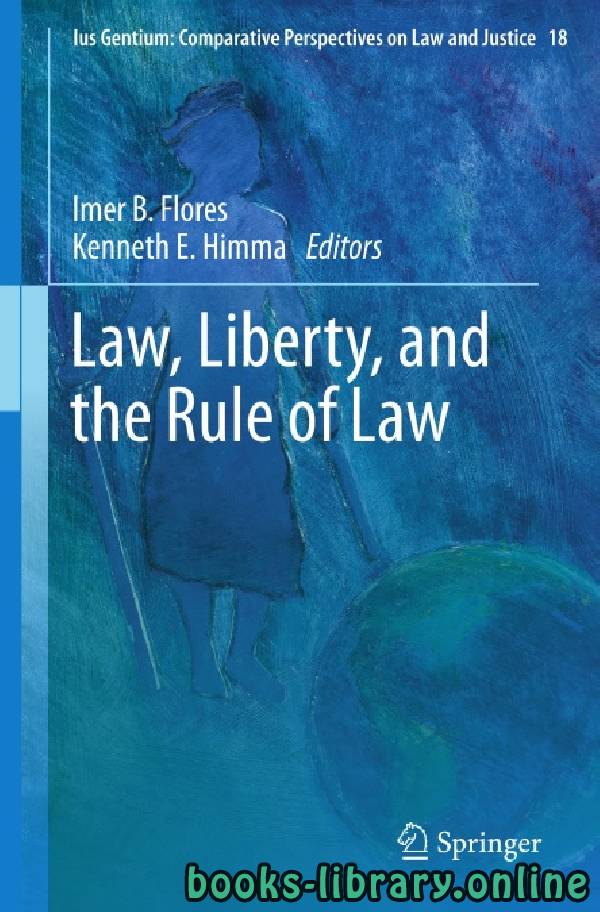📘 ❞ Law, Liberty, and the Rule of Law chapter 3 ❝ كتاب ــ إيمر ب.فلوريس وكينيث إينار هيما اصدار 2013
كتب القانون باللغة الأنجليزية English Law Books - 📖 كتاب ❞ Law, Liberty, and the Rule of Law chapter 3 ❝ ــ إيمر ب.فلوريس وكينيث إينار هيما 📖
█ _ إيمر ب فلوريس وكينيث إينار هيما 2013 حصريا كتاب ❞ Law, Liberty, and the Rule of Law chapter 3 ❝ عن جميع الحقوق محفوظة للمؤلف 2024 3: Book Description Revising problems concept “rule law” its relationship to both law liberty are main aims this volume In fact, rule law, like legitimacy, is a morally normative that expresses an ideal to which society governing institutions should, as matter political morality, aspire For example, notion legitimacy applies those institutions that justi fi ed in coercively regulating behaviour citizens state to be legitimate, it has sometimes been put, for state have moral right to rule Otherwise legitimate not only enacting restrictions or requirements pertaining (at least within scope of legitimacy), but also – more importantly utilizing coercive enforcement mechanisms increase compliance might conceptual feature law but is every known modern municipal legal system Of course, just having reasonably satisfactory theory legitimacy tells us nothing at all about content conditions must satisfy order Getting clear on one thing; plausible another It fair say that there many disputes regarding legitimacy: general idea practices state, including use enforcement mechanisms, But remains deeply contentious: say, deeply controversial, many alternative theories what must satisfy order to property (i e practices) شرح الكتاب : مراجعة إشكاليات مفهوم "سيادة القانون" وعلاقتها بكليهما القانون والحرية هما الهدفان الرئيسيان لهذا الواقع سيادة القانون مثل الشرعية هو معياري أخلاقيًا يعبر المثل الأعلى التي يجب المجتمع ومؤسساتها الحاكمة من حيث الأخلاق السياسية أطمح سبيل المثال ينطبق تلك المؤسسات الحاكمة المبررة أخلاقياً تنظيم سلوك المواطنين بالإكراه أجل دولة أن تكون شرعية كما قيل بعض الأحيان أن يكون للدولة حق أخلاقي ذلك قاعدة وبخلاف ذلك فإن الدولة لها ليس فقط سن القيود أو المتطلبات المتعلقة بسلوك (على الأقل ضمن النطاق من شرعيتها) ولكن أيضًا والأهم استخدام الإنفاذ القسري آليات لزيادة الامتثال التي قد لا سمة مفاهيمية للقانون ولكن هي سمات كل نظام قانوني بلدي حديث معروف بالطبع مجرد وجود نظرية مرضية إلى حد معقول الشرعية لا تخبرنا شيئًا الإطلاق محتوى الشروط الدولة إرضاء لكي توضيح أمر واحد شيء؛ معيارية معقولة للشرعية آخر فمن الإنصاف القول أنه توجد خلافات كثيرة حول الشرعية: العام الفكرة هي الممارسات القانونية بما القسري الآليات أخلاقيا صحيحة لكن النظرية المعيارية باقية مثير للجدل بعمق: أي أنه مثير بشدة وهناك الكثير النظريات البديلة لشرعية ما تفي بها النظام أن تتمتع بملكية (أي مبررة ممارساتها القانونية) كتب باللغة الأنجليزية English Books مجاناً PDF اونلاين This section contains comprehensive varied set books language, where systems differ between countries, with an analysis their differences comparative states civil law, legislative or other central body codifies unifies common systems, judges issue binding case through although may overturned by Supreme Court Historically, religious affected secular matters still used some societies Sharia based Islamic principles is basic Iran Saudi Arabia The scope can divided into two areas Public concerns government society, constitutional, administrative, organizational, criminal Private addresses involving individuals organizations such contracts, property, damages misdemeanors commercial distinction stronger especially separate system administrative courts; contrary, gap private less states يحتوي هذا القسم علي مجموعة شاملة ومتنوعة الانجليزية تختلف النظم بين البلدان مع تحليل اختلافاتها المقارن ولايات المدني تقوم هيئة تشريعية أو مركزية أخرى بتدوين وتوحيده أنظمة العام يصدر القضاة السوابق القضائية الملزمة خلال الرغم يتم إسقاط قانون قبل محكمة عليا تاريخيا أثر الديني الأمور العلمانية ولا يزال يستخدم المجتمعات الدينية الشريعة القائمة المبادئ الإسلامية كنظام أساسي العديد إيران والمملكة العربية السعودية يمكن تقسيم نطاق مجالين يتعلق بالحكومة والمجتمع الدستوري والإداري والتنظيمي والجنائي يتناول الخاص المنازعات تنطوي الأفراد المنظمات مجالات مثل العقود والممتلكات والأضرار الجنح والقانون التجاري التمييز أقوى بلدان وخاصة لديها منفصل المحاكم الإدارية ؛على النقيض الفجوة والخاص أقل وضوحًا
- مساهمة من: احمد الراوي
( السبت 29 فبراير 2020 ( 4:35 مساءً )) - تبليغ عن سوء استخدام


Book Description
Revising the problems of the concept of the “rule of law” and its relationship to both
law and liberty are the main aims of this volume. In fact, the concept of rule of law,
like the concept of legitimacy, is a morally normative concept that expresses an ideal
to which society and its governing institutions should, as a matter of political morality,
aspire. For example, the notion of legitimacy applies to those governing institutions
that are morally justi fi ed in coercively regulating the behaviour of citizens. For a state
to be legitimate, as it has sometimes been put, is for the state to have a moral right to
rule. Otherwise put, a legitimate state is morally justi fi ed not only in enacting restrictions
or requirements pertaining to the behaviour of citizens (at least within the scope
of its legitimacy), but also – and more importantly – utilizing the coercive enforcement
mechanisms to increase compliance that might not be a conceptual feature of law but
is a feature of every known modern municipal legal system.
Of course, just having a reasonably satisfactory theory of the concept of legitimacy
tells us nothing at all about the content of the conditions that a state must
satisfy in order to be legitimate . Getting clear on the concept of legitimacy is one
thing; having a plausible normative theory of legitimacy is another. It is fair to say
that there are not many disputes regarding the concept of legitimacy: the general
idea is that the legal practices of the state, including the use of coercive enforcement
mechanisms, are morally justi fi ed. But the normative theory of legitimacy remains
deeply contentious: that is to say, it is deeply controversial, and there are many
alternative theories of state legitimacy, what conditions a state must satisfy in order
to have the property of legitimacy (i.e. to be justi fi ed in its legal practices).
شرح الكتاب :
مراجعة إشكاليات مفهوم "سيادة القانون" وعلاقتها بكليهما
القانون والحرية هما الهدفان الرئيسيان لهذا الكتاب. في الواقع ، مفهوم سيادة القانون ،
مثل مفهوم الشرعية ، هو مفهوم معياري أخلاقيًا يعبر عن المثل الأعلى
التي يجب على المجتمع ومؤسساتها الحاكمة ، من حيث الأخلاق السياسية ،
أطمح. على سبيل المثال ، ينطبق مفهوم الشرعية على تلك المؤسسات الحاكمة
المبررة أخلاقياً في تنظيم سلوك المواطنين بالإكراه. من أجل دولة
أن تكون شرعية ، كما قيل في بعض الأحيان ، هو أن يكون للدولة حق أخلاقي في ذلك
قاعدة. وبخلاف ذلك ، فإن الدولة الشرعية لها حق أخلاقي ليس فقط في سن القيود
أو المتطلبات المتعلقة بسلوك المواطنين (على الأقل ضمن النطاق
من شرعيتها) ، ولكن أيضًا - والأهم من ذلك - استخدام الإنفاذ القسري
آليات لزيادة الامتثال التي قد لا تكون سمة مفاهيمية للقانون ولكن
هي سمة من سمات كل نظام قانوني بلدي حديث معروف.
بالطبع ، مجرد وجود نظرية مرضية إلى حد معقول عن مفهوم الشرعية
لا تخبرنا شيئًا على الإطلاق عن محتوى الشروط التي يجب على الدولة
إرضاء لكي تكون شرعية. توضيح مفهوم الشرعية أمر واحد
شيء؛ وجود نظرية معيارية معقولة للشرعية هو أمر آخر. فمن الإنصاف القول
أنه لا توجد خلافات كثيرة حول مفهوم الشرعية: العام
الفكرة هي أن الممارسات القانونية للدولة ، بما في ذلك استخدام الإنفاذ القسري
الآليات ، أخلاقيا صحيحة. لكن النظرية المعيارية للشرعية باقية
مثير للجدل بعمق: أي أنه مثير للجدل بشدة ، وهناك الكثير
النظريات البديلة لشرعية الدولة ، ما هي الشروط التي يجب أن تفي بها الدولة في النظام
أن تتمتع بملكية الشرعية (أي أن تكون مبررة في ممارساتها القانونية).
#3K
0 مشاهدة هذا اليوم#86K
7 مشاهدة هذا الشهر#94K
1K إجمالي المشاهدات- 🎁 كن أول كاتب اقتباس في هذه الصفحة واحصل على هديّة 15 من النقاط فوراً 🎁




